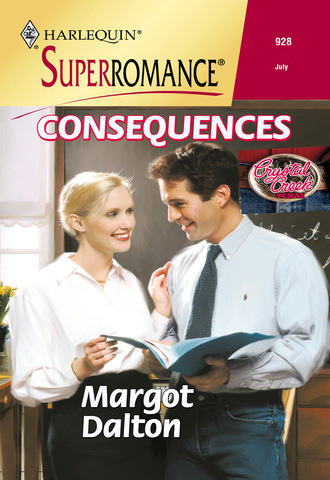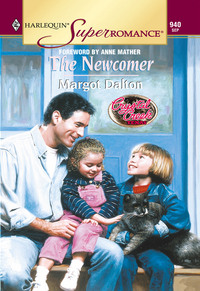
Полная версия
Consequences
Everything about June was strong, from her square shoulders to her sturdy brown legs in denim shorts. She had waist-length blond hair that she wore in a thick braid pinned on top of her head, and blue eyes so level and steady that most people had a hard time looking at her directly.
June Pollock was probably close to forty, and had lived all her life in Crystal Creek, except for a long-ago fling with an oil wildcatter that had ended her high-school career, broken her heart and left her with a baby girl to raise alone.
June’s daughter had been born with a club foot, but Carlie Pollock was a sweet girl, beloved by everybody in the town. At nineteen, after numerous surgeries, Carlie was able to walk and run normally, even ice-skate, and was off at college studying marine biology.
Lucia suspected that June missed Carlie a great deal, though with characteristic stoicism she gave no sign of her feelings. But it was probably loneliness that prompted her to rent parts of her house to strangers. Since her financial windfall a few years earlier, when June sold a valuable antique carousel horse that had been hidden in her cellar for more than sixty years, she no longer had any need of the rental income.
“You’ve got a good crop here,” Lucia commented, watching June work the hoe carefully around the ripening globes of pumpkins. “This looks like it could be your best year ever, June.”
“It will be if the nights ever start to cool down a bit.” June paused and brushed her forehead with a tanned arm, then resumed her task. “How’re things at school these days?”
Lucia looked up in surprise. Her landlady hardly ever initiated conversation of any kind, and certainly didn’t ask about Lucia’s job.
“It’s…fine, I guess.”
“Really? Well, I heard at work today that damn Gloria Wall is fixin’ to dump you,” June said with her usual bluntness.
Lucia gave her landlady a wan smile. “Yes, it appears she’s going to try. But I intend to do my very best not to get dumped.”
“Well, you’re gonna have your work cut out,” June said. “Lots of folks around this town just gotta hear ‘lower taxes,’ and they’re lining up to sign on the dotted line no matter what they stand to lose. Damn idiots!” she added, pounding away at the dried soil.
Lucia watched the woman’s muscular arms for a moment as they moved in steady rhythm. At last she ventured a question.
“June…”
“Yeah?”
“What can you tell me about James Whitley?”
June smiled, showing strong white teeth. “Jimmy Whitley? He grew up in this town, right down the street.”
“Really?” Lucia asked, startled.
“His daddy was the middle-school principal when I was a girl, worked in the very same office where you’re sittin’ nowadays. Little Jimmy, he was just the nicest kid,” June said thoughtfully, leaning on her hoe. “All big eyes, curly hair and dimples, and so smart nobody could believe it. We all thought he’d go to the moon someday, or grow up to be president. But he got bit by the rodeo bug as a teenager, and that was pretty much the end of him. It gets to a lot of boys that way.”
Lucia picked up a trailing vine and wrapped it around her finger, absorbing all this information.
“What happened to his father?”
“Well, that was a sad case.” June plied her hoe again, frowning. “Sarah Whitley, that’s Jim’s mother, she died of cancer quite young. After that, Carl Whitley just sort of lost his spirit. One day down at Lake Travis he swum out into the water and never came back. They found his body next day, tangled in some weeds.”
“And Jim…”
“He follows the rodeo circuit some years, and teaches school whenever he stays in one place long enough. My cousin up in Lampasas says they had Jim Whitley for a term with their eighth-graders, and he was the best teacher ever to set foot in that place. But he wouldn’t stay another year, even when they begged.”
“So you think he’d make a competent teacher at my school?”
June looked at her shrewdly.
“For God’s sake, Lucia,” she said. “Just hire the man and quit fretting over it. If Gloria Wall’s on your case, you’ll be having yourself a tough enough year ahead without passing up the chance to get a real fine teacher.”
“Well, I guess your recommendation is good enough for me.”
“Just be warned,” June said, “that you can’t make the man do anything he doesn’t want to. He may seem like a laid-back sort of guy, but he’s all steel at the core, Jim Whitley is. Nobody’s ever been able to push him around, and you won’t be able to, either.”
Lucia hesitated for a moment, then nerved herself to speak. “He told me you’d promised to rent him the apartment on the…”
But June was no longer listening. She stared toward the vine-covered fence rails bordering the garden, her face pale beneath the tan.
Startled by the other woman’s intensity, Lucia followed June’s gaze and saw Willard Kilmer, standing in the back lane, holding a manila file folder.
Willard was a member of Lucia’s staff. In fact, he taught the other group of seventh-graders. Bella’s stepdaughter, Ellie Gibson, was in his class.
He was a tall, thin man in his early forties, with pale thinning hair and a slight stoop. Willard seemed utterly drab and inconsequential until you noticed his eyes, which were filled with gentleness and lively intelligence behind horn-rimmed glasses.
Lucia had always liked the man, and they’d worked efficiently together in the years since she’d come to the school. But Willard was painfully shy, and not easy to get close to. At faculty meetings and social functions he kept to himself, usually watching from a corner and saying little.
He lived with his ailing mother in a big, well-kept house a couple of streets over from June’s. Lucia often wondered about his personal life, and whether he was as lonely as he appeared to be.
“Hello, Willard,” she said, smiling across the fence in an attempt to set him at ease. “It’s a nice evening, isn’t it? Not quite so hot today.”
“It’s warm enough, but considerably better than yesterday,” he agreed, clearing his throat. The dying sunlight flashed off the lenses of his glasses, making him look remote and sad. “Mama tends to suffer a good deal in the heat, I’m afraid.”
“I reckon we all do,” June said with her customary bluntness, hammering at a stubborn clod of dirt with her hoe. “But we don’t talk about it all the time, because complaining won’t make it any cooler.”
“Hello, June,” the teacher said shyly. “Your pumpkins are looking great this year. I’ll have to remember to pick one up before Halloween.”
“Don’t worry, I’ll set a good one aside for you.” June turned her back and knelt to pull at a weed under one of the pumpkin vines.
“The sixth-graders are having a pumpkin-carving contest this year,” Willard told Lucia with a timid, luminous smile that made his craggy face light up. “They’re allowing me to enter, and I aim to win first prize.”
Lucia smiled back at him. “I’m sure you’re going to win. I’ve seen those artistic jack-o’-lanterns you carve.”
For a moment he seemed taken aback, almost panicky, as if he’d suddenly realized he was having a casual conversation with two women outside the safe confines of the school.
Lucia took pity on him and gestured toward the manila folder in his hand. “What have you got there, Will?” she asked.
“Oh, it’s…” He waved the folder nervously. “I just brought this over for you to look at. It’s a proposal for that new social studies curriculum we were talking about last week.”
“Thank you,” she said, a little puzzled, watching as he opened the gate awkwardly and came into the garden to hand her the folder. “I’ll have a look at it right away and let you know what I think.”
“Oh, there’s no rush.” He stood in front of the bench like a long-legged stork in his rumpled khakis and knitted vest. “We won’t be starting that unit until the next semester, anyhow.”
Then why did you come all the way over here to bring it to me tonight? Lucia wanted to ask.
But there was something strange in the air, an odd tension in the way he stood at the edge of the garden while June kept chopping at her weeds.
Finally Willard turned and made his way back toward the gate, casting a brief wistful glance at the garden and the silent woman among her pumpkin vines. He turned back to Lucia.
“Well,” he said, “I guess I should be pushing off now.”
She ached for him in his nervousness, and glanced around to see if June might be disposed to offer this unexpected guest a glass of iced tea or some of the blueberry tarts she’d made that afternoon.
Lucia could hardly invite him up to her own apartment, not the way this community watched and gossiped. If she did, it would be all over town by morning that Ms. Osborne was entertaining a male colleague in the privacy of her rooms.
Even the students would know, and be whispering about it…
But June was still wielding the hoe, her face impassive as she worked.
“Good evening, Will,” the landlady said with odd formality. “Don’t forget to stop by and pick up that pumpkin, will you?”
“I won’t forget, June.” He paused with his knobby hand on the latch.
By now Lucia was deeply intrigued, looking from June to Willard.
“Well, good night,” he said at last, his Adam’s apple jerking nervously. “I’ll see you at school, Lucia. Good night, June.”
Lucia murmured another farewell but June said nothing, just turned away deliberately and began to work along the fence line, her shoulders rigid.
Willard Kilmer trudged off, his thin back swallowed up in the hedges down the lane.
When he was out of sight, June rested her hoe against the fence, plodded through the garden and sprawled on the bench next to Lucia. She sighed wearily and rubbed one of her shoulders.
Lucia stole a cautious glance at her landlady, whose composure seemed badly unsettled for some reason.
“June,” she ventured at last. “Is something the matter?”
“That man just gets under my skin,” June said. “He makes me so mad I could scream.”
“Willard?” Astonished, Lucia thought about her mild-mannered colleague. “That’s not the effect he normally has on people. Most of the time,” she added, “it’s hard to even remember he’s in the room.”
“He can sing like an angel,” June said, surprising her again. “Did you know that? Will’s a true baritone, and he has perfect pitch.”
“No kidding. How did you happen to learn that?”
“He sings in the choir with me, down at the Baptist church.”
Though Lucia never attended church, she knew that June Pollock had a fine alto voice. But in the seven years of Lucia’s relationship with Willard Kilmer, this was the first she’d heard of his musical talents.
“And he has one of the best arrowhead collections in the whole state,” June went on, stretching her legs and letting her blond head rest against the back of the bench. There were some silver strands among the rich gold, and her face looked tired and strained.
“An arrowhead collection?” Lucia asked blankly.
“He goes out most weekends to hunt for arrowheads in plowed fields and washed-out creek beds. Whatever Will finds he catalogs and mounts, enters the information on a big computer file. Colleges and museums even contact him sometimes to borrow parts of his collection.”
“Imagine the man never talking about that at school,” Lucia marveled, then looked at her companion, still puzzled by June’s reaction. “But why does he make you so angry?”
“Because he’s wasting his life.” June frowned at the rustling branches above her, where a nighthawk fluttered and woke to set out on its evening hunt for insects.
“Willard is wasting his life?”
“He lives with that awful mother of his, and she’s got him wrapped around her little finger. She’ll never let loose of him. Willard Kilmer doesn’t have the courage of a mouse or he’d tell her where to get off, the nasty old dragon.”
“But how can you…” Lucia paused, genuinely shocked by this harshness. “Faye Kilmer’s an invalid, June. She can hardly get out of her chair to walk across the room. Everybody knows that.”
“Invalid!” June snorted, her face hardening. “Liar is more like it.”
“I can’t believe you’d say that. Willard brought her to the staff Christmas party last year, and she was so sweet to everybody. I thought Faye Kilmer was a lovely woman.”
“Oh, sure, everybody thinks Faye’s such a lovely woman.” June got to her feet and began to chop aimlessly among the vines again. “She’s so little and dainty, with her big eyes and lace dresses and that I’m-so-delicate-I-might-break act of hers. But the woman’s made of iron, let me tell you.”
“She spends a lot of her time in the hospital, you know,” Lucia said gently, watching June’s tense broad shoulders.
“Sure she does,” June said. “Whenever it looks as if Will might be getting a life and planning to move out on her, Faye has some kind of attack. And then she’s just way too helpless to look after herself, so he creeps right back into line.”
“You think Faye Kilmer is using her medical condition as some kind of emotional blackmail over Willard?”
“I think she’s a truly selfish woman. It’s my opinion,” June said, “that Faye will never let go of him as long as she lives. And,” she added darkly, “mark my words, Faye’s likely to outlive all of us. Those kind always do, you know.”
“Have you ever told Willard what you think about any of this?”
June turned to look at her directly, and Lucia was stunned by the depths of pain and sadness in those level blue eyes.
“It’s hardly the kind of thing I could say to Will. Never in all this world. But dammit, Lucia, sometimes I wish I could.”
“You care a lot about him,” Lucia said gently. “Don’t you, June?”
A bit of color filled June’s tanned cheeks. She waved her hand in an abrupt, dismissive gesture, then let her shoulders drop, leaning on the hoe.
“Well, I guess maybe I do,” she said. “He’s such a nice man, you know. There’s times,” she added shyly, “when I hear him sing and it purely gives me goose bumps all over.”
She turned away, clearly embarrassed by this revelation, and knelt to tug at a weed near one of the biggest pumpkins.
“Once,” she said over her shoulder, “about four years ago, Will asked me to go along with him for the day, hunting arrowheads over by Llano. I packed a picnic lunch and we had a real nice time, even if he was too shy to talk to me very much. I found a big flint spear point, and Will made a wooden frame for it and gave it to me.”
“That sounds really nice,” Lucia said.
“It’s a beautiful thing. I still have it hanging in my front room.”
“So, did he ask you out again after that?” Lucia asked when June fell silent.
“Yes, he did. A week later he invited me to go with him to the church social. I went into Austin and bought a new dress, first one I’d had in years. Even had my hair done,” she added with a wry grimace. “Silly fool that I am.”
“And what happened?”
“The day before the social, Faye had one of her attacks. Will had to rush her to the hospital in Austin and spend about four days at her bedside because she refused to eat unless he fed her with a spoon. After that,” June said, “any time he asked, I turned him down, and it wasn’t long before he gave up.”
“Yes, I can understand that he’d soon give up,” Lucia said. “Willard’s so shy, I’m sure it would be awfully hard for him to ask a woman out and get turned down.”
“No doubt,” June said grimly. “I reckon it hurt him, all right.”
Lucia looked at the other woman’s bent head, with its heavy braid that flared dull gold in the dying sun. “But, June,” she ventured at last, “if the woman was really sick…”
“That’s just it.” June got to her feet and leaned the hoe against the fence. “I don’t believe Faye was sick any more than I was. I think she was just trying to keep Will from going out with me again. And the very same thing’s bound to happen, anytime he ever decides to have a life of his own.”
Lucia stared at the pumpkins, wondering what to say.
With June in such a rare confiding mood, Lucia was almost tempted to tell some of her own troubles. But the other woman had clearly had enough of personal revelations.
“Come on inside,” June told her, forcing a smile. “That’s enough talk for one night. I don’t know what got into me, blabbing my head off like this.” She paused for a moment, then added, “Let’s get moving. Take that hoe and shovel to the shed for me, and I’ll put the teapot on and give you some of those blueberry tarts I just made. You’re looking thin as a rail these days. I don’t know what women like you eat, but it’s sure not enough to keep a bird alive.”
Lucia got to her feet silently, put away the garden tools and followed the other woman into the house.
Behind them, the setting sun painted the western sky with a swirl of pastel colors and turned the rolling hills a deep soft mauve in the distance.
CHAPTER FOUR
AS USUAL, Monday morning was filled with a myriad of chores, all the daily administrative duties associated with running a good-size school. Still, Lucia was grateful for the busywork that kept her mind off her problems.
But by eleven o’clock, she could delay no longer.
With a touch of uneasiness and some other vague, distressing emotions that she was afraid to examine too closely, Lucia picked up the telephone to dial the number on Jim Whitley’s application form.
The phone rang incessantly at the other end, and Lucia frowned and tapped her fingers on the desktop as she waited.
At last she hung up and sat gazing at a framed diploma on the opposite wall, trying to picture the guest house on the McKinney ranch property. Lucia hadn’t seen the place for years, but recalled it as a rustic, lodge-style building, a big single room with fireplace and attached bath.
The guest house was pleasant and cozy, but there wasn’t much reason for a young man to be sitting there alone on a warm autumn morning.
After a brief hesitation, she looked up another number and dialed the main house at J.T. McKinney’s ranch. This time the phone was answered promptly by a warm female voice that brimmed with laughter.
“McKinney ranch, Lettie Mae speaking.”
“Hi, Lettie Mae. It’s Lucia Osborne calling. How are you this morning?”
“Well, I’m right as rain, Miss Lucia,” the cook said. “But I sure hope I’m not fixin’ to be called down to the principal’s office.”
Lucia laughed, picturing Lettie Mae’s silver hair, her quick smile and rich brown skin.
Lettie Mae Reese was one of the most beloved people at the Double C ranch, where she had been in residence for more than forty years. She also wielded a good deal of quiet, intelligent power behind the scenes, and provided motherly warmth and guidance to all three of J.T.’s grown children—Cal, Tyler and their sister, Lynn.
“As far as I know,” Lucia said, “your behavior has been exemplary, Lettie Mae. I was just wondering if you could tell me where I might get hold of James Whitley this morning. I understand he’s staying at the ranch.”
“He sure is, and he’s right here underfoot, trying to steal the recipe for my Double C chili. Come here, Jimmy,” the cook added, her voice suddenly distant as she moved away from the telephone. “It’s for you. Now stop messing with my saucepans, you young criminal. Git out!”
Lucia heard the sound of a slap, followed by gales of laughter. It sounded like a happy time in the big ranch kitchen, and she smiled wistfully.
But when a cheerful male voice filled the telephone receiver, all her tension returned.
“Mr. Whitley?” she said.
“I thought I told you to call me Jim. How are you this beautiful morning, Lucia?”
His voice was warm and somehow intimate, as if they were longtime friends and he genuinely cared about her welfare.
“I’m well, thank you,” Lucia said, wondering how the man had such an ability to unnerve her. “I had no idea you were interested in culinary pursuits.”
“Culinary pursuits,” he echoed, his voice teasing. “Is that what I’m interested in?”
“Well, you’re apparently hanging around in the kitchen on a Monday morning, bothering the cook. I’m not sure how else to describe it.”
“Hell, I just want to get hold of that secret recipe for Lettie Mae’s chili.”
“Why?” Lucia asked.
“If I could ever steal her recipe, I’d open a trendy restaurant in Austin, live off the profits and never have to teach school again.”
“From what I know of the restaurant business,” Lucia said, “I think it might be even more stressful than teaching.”
“But much less confining. With a good staff and Lettie Mae’s chili, I’d be free to roam all over the country and go to as many rodeos as I wanted. Hey, Lettie Mae,” he called, “you want to come and manage my restaurant? We’ll both get rich.”
Lucia heard a derisive snort in the background.
“A woman would have to be crazy to get tied up with you, Jim Whitley,” she heard Lettie Mae say firmly. “For any reason.”
“Now, I’m real hurt by that.” Jim returned to the phone, his voice full of amusement. “Lucia, don’t you think she’s being pretty harsh, turning down a legitimate business offer without even thinking it over?”
“I think Lettie Mae’s a very sensible woman,” Lucia said, refusing to be drawn into the fun. “And speaking of legitimate offers, I would like to discuss your job application.”
“Okay. When do you want me to start?”
“Why do you constantly assume I’m planning to hire you?” she asked, annoyed again by his brash, irrepressible manner.
“Because you’ve taken the trouble to track me all the way to Lettie Mae’s kitchen.” He lowered his voice. “Hey, Lucia, I think she’s sneaking dill into that chili. Did you ever hear of such a thing?”
“Look, Mr. Whitley—”
“Call me Jim.”
Lucia sighed. “Regarding this job, it seems I have no option. As you pointed out, we need a teacher right away. And this is quite a large and difficult class.”
“I can handle them,” he said with that placid, masculine arrogance that set her teeth on edge. “So, do you want me to start tomorrow? June said I could move my things in today.”
Lucia felt a wave of alarm, picturing this man simultaneously invading both her school and her home.
By tomorrow night there would be no sanctuary from him, anywhere…
“Lucia?” he asked.
“All right,” she said in defeat. “The school board’s approved your application, so I suppose you can start tomorrow morning. We can also discuss the details of your salary for this month, since you’ll only be working for part of the final week.”
“Sounds good to me.”
“If you could spare some time this afternoon,” Lucia went on, “I’ve called a meeting for three o’clock. I’d like you to be there so you can meet the rest of the staff and get caught up on certain issues facing our school.”
“Three o’clock,” he said. “That sounds fine. I can haul a load of my stuff over to June’s after lunch, then stop in at the school.”
“Thank you,” Lucia said. “I’ll have a class list ready for you. Goodbye, Mr. Whitley.”
“If you don’t start calling me Jim, I’ll find a job in another school.”
“Now, Jimmy,” Lettie Mae called from the background, “you quit teasing Miss Lucia. That poor girl has to deal with impudent puppies all day long.”
Jim laughed, a warm masculine sound. “Don’t worry, Lettie Mae. I intend to be real nice to this lady,” he said with a seriousness that made Lucia’s cheeks turn warm.
“I’ll see you at three o’clock in the staff lounge,” she said, and hung up quickly before he could say anything else.
JIM ENTERED the school in the afternoon, dodging noisy swarms of children who hurried past him, clearly excited at this early release from classes.
He strolled through the hallways to the teachers’ lounge, enjoying the unique vibrancy of a school housing young adolescents.
There was something about a middle school that always made him happy. He liked the raw vigor of the artwork on the walls, the sense of optimism and innocence, the sheer joy of children.






